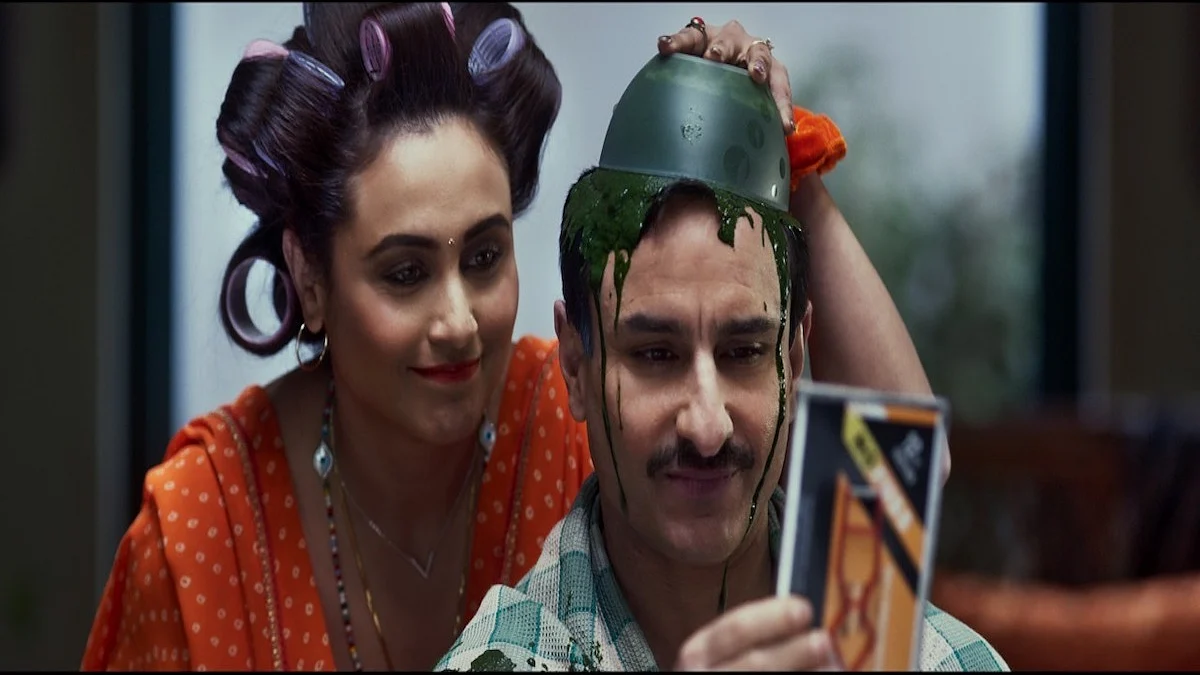'Bunty Aur Babli 2': Babli saves the day!
The original worked because it could log into the dreams, ambitions and suffocations of small-town youth of North India. That demographic has aged, and the film doesn’t know how to carry on with them

I ventured into the theatre to watch Bunty Aur Babli 2 just as the prime minister announced the repealing of the farm laws. What transpired inside couldn’t have been a patch on the drama and comedy unfolding outside; the epic hilarity of the meltdown of the assorted bhakts at the PM’s decision is leagues ahead of the shenanigans of the two sets of partners in crime—Bunty and Babli—on screen. However, let me not allow politics to distract from a film about con games, even though there can be no bigger game of deception than politics itself.
So, first things first. As was evident from the trailer itself, the shadow of the original hangs heavy on the sequel, the hard-earned magic of the past almost does a vanishing act here. The Bunty and Babli (Rani Mukerji and Saif Ali Khan) from back in 2005 have retired to comfortable domesticity and parenthood in Phursatganj when they are suddenly called in to help nab a new, upgraded, 2.0 version of their own selves (Sharvari Wagh and Siddhant Chaturvedi), who have been bluffing their way around, from Delhi to Varanasi and Kanpur.
The script is a series of con set-pieces stitched together with interludes of this or that. No problems there so long as the swindles are exhilarating enough. So, the horny, pot-bellied uncles and impassive cops of Delhi might be just about right, but the incident involving them, and the foreign trip dupe is itself too done to death and tame.
A brief, blink and you miss flashback to the past, to establish the antecedent of Jatayu Singh (Pankaj Tripathi) is, in fact, more inspired than most of the film itself. And props also for the Ganga-on-lease game—to weave it around the idea of public-private partnership to clean up the river is both timely as well as tongue-in-cheek indeed!
But soon things collapse into the blah with some goody-goody anaaj (grains) ki chori for the poor and an income tax raid of Rs 200 crore. The prolonged second half is entirely devoted to converting black money to white wherein the likes of Priyanka. Katrina and Bipasha replace Gandhi on the fake notes. Notebandi, hawala, money-laundering, all of it does ring a bell but the good nods needn’t have been so utterly lacking in joy.
Vimmi aka Babli with her fake Sabyasachi’s, garish makeup, nail polish, rollers and blow-dried hair, kitsch and colours are still a delight and brings things alive by playing to the gallery. The same can’t be said about Rakesh, as in Bunty. Saif Ali Khan looks unhappy stepping in as Bunty, doesn’t seem to belong to the world, his beer belly and henna-ed hair notwithstanding.
So, Abhishek Bachchan is sorely missed but more than that it’s the writing of Jaideep Sahni, his keen understanding of characters and the universe in which they are located and, of course, the terrific wit. Rani Mukherji might still be wonderful and brings the house down with her frustration at having to make “well-done ande” while somebody else has run away with their con brand, but there’s not one dialogue here that can hold a candle to the iconic “main ek aur martbaan aam ka achaar nahin daal sakti” in the 2005 film.
The original worked because it could log into the dreams and ambitions and suffocations of the youth of small-town North India. That demographic has aged, and the film doesn’t know how to carry on with them. So, it tries to reach out to a new, young audience; those who study in the sundry institutes on the UP Expressway. A long sequence of tirade about high fees and lack of jobs and unemployment, however, is not enough to capture the contemporary angst, if there’s any. Forget capturing the zeitgeist, it is not able to do anything more than scratch the surface.
It’s the same with the music. Be it Kajrare, Dhadak Dhadak, Nach Baliye aur Chup Chup Ke, the Gulzar-SEL compositions are remembered till date, while the Amitabh Bhattacharya-SEL collaboration on the soundtrack is the least memorable.
Having said all that, I would add at least this much in this franchisee’s defence. That it is much more welcome than the macho Singham, Simmba and Sooryavanshi variants. And that watching Rani Mukherji, even in a dull vehicle like the new YRF film, is worth all the Akshay Kumars and Ajay Devgans put together. Is that saying much?
Follow us on: Facebook, Twitter, Google News, Instagram
Join our official telegram channel (@nationalherald) and stay updated with the latest headlines